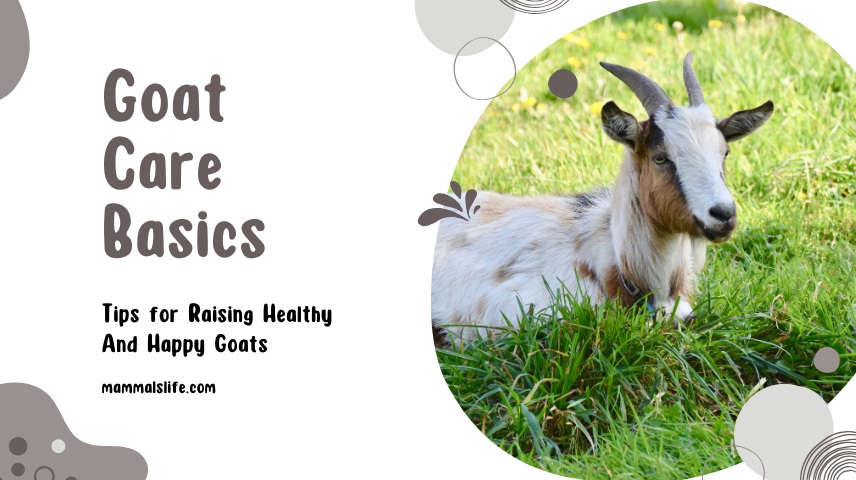Last Updated on February 22, 2025 by Mammals Life
Goat care basics include providing proper nutrition, clean water, and a safe shelter. Regular health check-ups ensure they remain healthy.
Raising healthy and happy goats requires attention to their diet, shelter, and overall well-being. Goats need a balanced diet rich in hay, grains, and freshwater. Ensure their shelter is clean, dry, and spacious, protecting them from extreme weather. Regular health check-ups and vaccinations are crucial to prevent diseases.
Social interaction and mental stimulation keep goats content. Understanding their behavior and needs helps in providing proper care. Proper hoof trimming, parasite control, and grooming contribute to their health. With these basics, you can ensure your goats thrive and remain happy.
Choosing The Right Breed
Choosing the right breed of goat is crucial for a successful goat farming experience. Different breeds have unique characteristics and purposes. The right choice can make your goat-raising journey enjoyable and rewarding.
Dairy Vs. Meat Goats
There are two main types of goats: dairy goats and meat goats. Dairy goats are known for their milk production, while meat goats are raised for their meat. Here’s a quick comparison:
| Aspect | Dairy Goats | Meat Goats |
|---|---|---|
| Purpose | Milk production | Meat production |
| Popular Breeds | Alpine, Saanen, Nubian | Boer, Kiko, Spanish |
| Milk Yield | High | Low |
| Body Size | Medium | Large |
Temperament Considerations
The temperament of a goat breed is another important factor. Friendly and calm goats are easier to manage, especially for beginners. Different breeds have different temperaments:
- Nubian Goats: Friendly and sociable. Great for families.
- Boer Goats: Calm and easy-going. Ideal for meat production.
- Alpine Goats: Active and curious. Perfect for dairy farming.
Choosing a breed with a suitable temperament can reduce stress for both you and the goats. It also ensures a harmonious environment on your farm.
Feeding Essentials
Feeding your goats properly is essential for their health and happiness. A good diet keeps them strong and productive. Here are some feeding essentials to help you raise healthy and happy goats.
Balanced Diet
Goats need a balanced diet to stay healthy. Their diet should include:
- Hay
- Grains
- Fruits
- Vegetables
Hay should make up most of their diet. It provides fiber and keeps their digestive system healthy. Grain is also important but should be given in small amounts. Too much grain can cause health problems. Fresh fruits and vegetables provide vitamins and minerals.
Supplement Needs
Goats may need extra supplements to stay healthy. Common supplements include:
- Mineral blocks
- Salt licks
- Vitamin supplements
Mineral blocks and salt licks provide essential minerals that goats may not get from their diet. Vitamin supplements can be given if your goats are not getting enough vitamins from their food. Always check with a vet before adding supplements.
Here is a simple table to summarize their feeding essentials:
| Food | Amount | Frequency |
|---|---|---|
| Hay | Unlimited | Daily |
| Grains | 1-2 cups | Daily |
| Fruits | 1-2 pieces | Weekly |
| Vegetables | 1-2 pieces | Weekly |
Housing Requirements
Providing proper housing for your goats is crucial for their health and happiness. Goats need a safe, clean, and comfortable environment. This helps protect them from predators and harsh weather conditions. Let’s look at the basics of goat housing.
Shelter Design
A well-designed goat shelter should be dry, draft-free, and well-ventilated. Good ventilation helps prevent respiratory issues. The shelter should have a sturdy roof to keep out rain and snow. Walls should be strong enough to withstand strong winds. Use materials like wood or metal for durability.
Consider installing windows or vents for natural light and airflow. Ensure the shelter has raised flooring. This prevents water from pooling inside. A raised floor also keeps the goats warm and dry.
Space Allocation
Each goat needs enough space to move freely. Crowded conditions can lead to stress and disease.
| Goat Type | Space Requirement |
|---|---|
| Adult Goat | 15-20 square feet per goat |
| Kid (Young Goat) | 5-10 square feet per kid |
Provide separate areas for feeding, sleeping, and exercise. This helps maintain cleanliness and order. Use bedding materials like straw or wood shavings. These provide comfort and absorb moisture.
Ensure there is adequate fencing around the shelter. Fencing should be at least 4 feet high. This prevents goats from escaping and keeps predators out. Use materials like woven wire or electric fencing.
Keep the shelter clean and dry. Remove soiled bedding regularly. This prevents the buildup of harmful bacteria and parasites.
Health Management
Proper health management is key to raising happy and healthy goats. It involves regular monitoring, timely treatments, and preventive measures. Keeping goats healthy requires dedication and knowledge. Let’s explore the essential aspects of health management for goats.
Routine Checkups
Routine checkups are essential for maintaining your goats’ health. Regular visits from a veterinarian can identify potential issues early. Perform daily visual inspections of your goats. Look for signs of discomfort, injury, or illness.
- Check their eyes for brightness and clarity.
- Observe their coat for signs of parasites or bald spots.
- Ensure they have a healthy appetite and are drinking water.
- Feel their body to check for unusual lumps or swelling.
Schedule annual health checkups with a vet. Keep records of all vaccinations and treatments.
Common Diseases
Awareness of common goat diseases is crucial. It helps in early identification and treatment. Here are some common diseases that affect goats:
| Disease | Symptoms | Prevention |
|---|---|---|
| Foot Rot | Lameness, swollen feet | Keep living areas clean and dry. |
| Mastitis | Swollen udder, reduced milk production | Maintain good hygiene and regular milking. |
| Scrapie | Itching, loss of coordination | Purchase goats from reputable sources. |
Recognizing symptoms early can save your goat’s life. Consult your vet for proper diagnosis and treatment.
Vaccinations are vital in preventing diseases. Ensure your goats get vaccinated against CDT (Clostridium perfringens types C and D and tetanus). Follow your veterinarian’s advice on other essential vaccinations.
Parasite control is also important. Regularly deworm your goats and check for external parasites like lice and mites. Use appropriate dewormers and follow a deworming schedule advised by your vet.
Grooming Practices
Grooming is essential for maintaining the health and happiness of your goats. Proper grooming practices can prevent health issues and help you bond with your goats. Here are some key aspects of grooming to keep your goats in top shape.
Hoof Trimming
Hoof trimming is crucial for your goat’s mobility and overall health. Overgrown hooves can cause pain and infections. Aim to trim your goat’s hooves every 4-6 weeks.
| Step | Description |
|---|---|
| 1 | Secure the goat properly. |
| 2 | Clean the hooves with a brush. |
| 3 | Use hoof trimmers to cut excess growth. |
| 4 | Check for signs of infection. |
Regular hoof trimming keeps your goats comfortable and prevents disease. Always use sharp, clean tools for trimming.
Coat Care
Maintaining your goat’s coat is essential for their health and well-being. Brush your goats regularly to remove dirt, debris, and loose hair.
- Short-haired goats: Brush weekly to keep the coat clean.
- Long-haired goats: Brush more often to prevent matting.
Bathing is not typically needed unless your goat gets very dirty. If you must bathe them, use a gentle, goat-friendly shampoo.
Parasite control is also part of coat care. Check your goats for lice and mites regularly. Use appropriate treatments if needed. A well-groomed coat reflects a healthy goat and ensures they remain comfortable in their environment.
Breeding Tips
Raising healthy and happy goats involves understanding their breeding needs. Proper breeding techniques ensure a healthy herd and improve overall goat quality. This section covers essential breeding tips for goat care.
Mating Season
Goats typically mate in the fall. This season is best for breeding. The ideal mating age for female goats is 18 months.
Ensure both male and female goats are healthy. Provide a balanced diet rich in nutrients. Check for any signs of illness before mating.
Monitor the female goats for signs of estrus. These signs include tail wagging and increased vocalization. Introduce the male goat to the female during this period.
Newborn Care
Newborn goat care is crucial for their survival and growth. Immediately after birth, clean the newborn goat with a towel. This helps remove any mucus and stimulates breathing.
Ensure the newborn goat gets colostrum within the first hour. Colostrum is rich in antibodies and vital nutrients.
- Keep the birthing area clean and dry.
- Monitor the mother and newborn closely.
- Provide warmth using heat lamps or blankets.
If the mother goat is unable to nurse, use a bottle feeder. Ensure the milk replacement formula is suitable for goats.
Regularly check the newborn for signs of illness. Common issues include diarrhea and dehydration. Consult a vet if any issues arise.
Frequently Asked Questions
How To Care For A Goat For Beginners?
Provide fresh water, nutritious feed, and shelter. Regularly trim hooves and check for parasites. Vaccinate and deworm as needed. Offer companionship and space to roam.
What Does A Goat Need To Be Happy?
A goat needs fresh water, nutritious food, shelter, social interaction, and space to roam. Regular health check-ups are essential too.
How Do You Raise A Happy Goat?
To raise a happy goat, provide a balanced diet, clean water, and shelter. Ensure regular health checks and vaccinations. Give ample space for grazing and social interaction. Provide mental stimulation with toys and structures.
What Maintenance Does A Goat Need?
Goats need regular feeding, clean water, shelter, and health check-ups. Trim hooves and provide vaccinations. Maintain clean living areas.
What Do Goats Need For Shelter?
Goats need a dry, draft-free shelter with good ventilation to stay healthy.
How Often Should Goats Be Fed?
Feed goats twice daily with a balanced diet of hay, grains, and freshwater.
Conclusion
Raising healthy and happy goats requires proper care and attention. Follow these tips for successful goat farming. Ensure their diet is balanced and their shelter is clean. Regular check-ups with a vet can prevent health issues. With dedication, your goats will thrive and bring joy to your farm.








